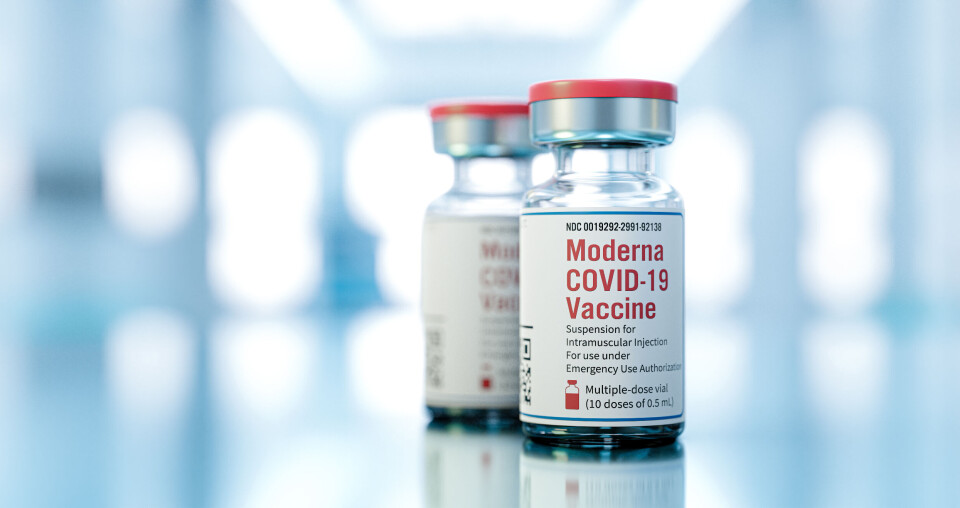-
White storks make strong return in France via nest ‘platforms’ and clipped wings
The Ligue pour la Protection des Oiseaux shares the conservation challenges in saving these birds from extinction
-
Hosting scheme in south-west France lets newcomers sample lifestyle
Households in nine Dordogne communes volunteer under Mes Nouveaux Voisins scheme
-
French boulangeries demand right for staff to work on May 1 so they can open
Artisan bakery owners can work but employees cannot, while certain industrial bakeries are allowed to remain open with workers
Moderna approved by EU as booster jab, one week after France stops it
French health authorities have recommended only using Pfizer-BioNTech as a booster Covid jab, and have not yet responded to the EU medicines agency’s latest announcement

The EU’s medicines agency has approved the use of the Moderna Covid vaccine as a booster jab for the general public. It was previously only approved for use as a booster vaccine for adults who have severely weakened immune systems.
The European Medicines Agency’s (EMA) decision comes one week after French health authorities said they would stop using Moderna for booster jabs until the EMA approved it for the wider public.
Read more: Why France is no longer using Moderna for Covid booster jabs
France is currently offering booster Covid vaccine doses to:
-
People over 65
-
Medical professionals
-
People at risk of serious forms of Covid (including those with diabetes and obesity issues)
-
People who are severely immunocompromised and their close friends and family
-
People who received one dose of the Johnson & Johnson (Janssen) vaccine are eligible to receive a booster vaccine dose in France
The Haute Autorité de Santé (HAS) said on October 15 that for the time being it recommended that the booster campaign use only Pfizer-BioNTech’s Covid vaccine, which the EMA has already approved for use among all adults (aged 18 and over).
The HAS has not yet publicly responded to the EMA’s latest decision on Moderna.
What did the EMA say?
The agency said that data showed that a third dose of Moderna, given between six and eight months after the second, would lead to an increase in antibodies that protect against Covid.
The booster dose should be half of the dose that is usually given to adults, and side effects were similar to those experienced after the second dose.
“The risk of inflammatory heart conditions or other very rare side effects after a booster is being carefully monitored,” the EMA wrote.
There have been very rare cases of heart inflammation syndromes reported in young adults who were vaccinated with either Moderna or Pfizer-BioNTech’s Covid vaccines.
In early October, Sweden and Finland suspended the use of Moderna's vaccine for those under 30, and Denmark and Norway strongly advised against its use for those under 18.
Iceland has suspended the use of Moderna’s vaccine as a booster dose altogether.
These measures were cited by HAS in its decision to recommend against using Moderna as a booster dose last week.
It wrote that the vaccine could lead to a possible risk of inflammation of the myocardium, the heart muscle, and the pericardium, the membrane covering the heart.
It added that most of these inflammations are benign and pass on their own, but medical advice is recommended if symptoms occur.
Will France offer booster Covid doses to the wider public?
The government has not yet stated whether it will roll out booster Covid vaccine doses to the general public.
The World Health Organisation has repeatedly spoken out against wealthy nations offering booster doses to their healthy citizens, asking instead for doses to be given to countries with minimal vaccination rates.
France’ health minister Olivier Véran said last Friday (October 22) that for now, under 65s were not included in the booster dose campaign.
He said, though, that the takeup of people eligible for a booster and choosing to get vaccinated was not sufficient. He added that it would “not be illogical to integrate the third dose into the health pass”.
A person in France is currently deemed fully vaccinated after two doses of the Pfizer-BioNTech, Moderna and AstraZeneca vaccines, and one dose of the Janssen (Johnson & Johnson) vaccine.
A fully vaccinated person can use their vaccination certificate as part of France’s health pass scheme, which requires proof of Covid status to enter the majority of public places.
Currently, over 65s do not need a third Covid vaccine dose to be considered fully vaccinated.
Read more: Will my French health pass become invalid if I refuse my booster dose?
Prime Minister Jean Castex has said that the question of whether a third Covid dose will be required to be considered fully vaccinated and therefore have a valid health pass has been put to France’ health bodies, including the HAS.
The number of Covid cases in France is steadily increasing, with an average of 5,091 positive tests each day, an increase of 9% from last week.
Mr Véran said that cases across Europe are rising, but “we are not in an epidemic wave”.
“The increase is moderate, it’s cold and wet, so Covid is circulating more, which is what we expected,” he said in an interview with BFMTV on October 22.
He said he did not expect to see a significant increase in hospitalisations as the “population is mostly vaccinated”.
Just over 74% of France’s entire population has been fully vaccinated against Covid.
Related articles
Coronavirus: Daily updates on the situation in France
Recap: Key points to note on Covid vaccines for UK-France trips
























